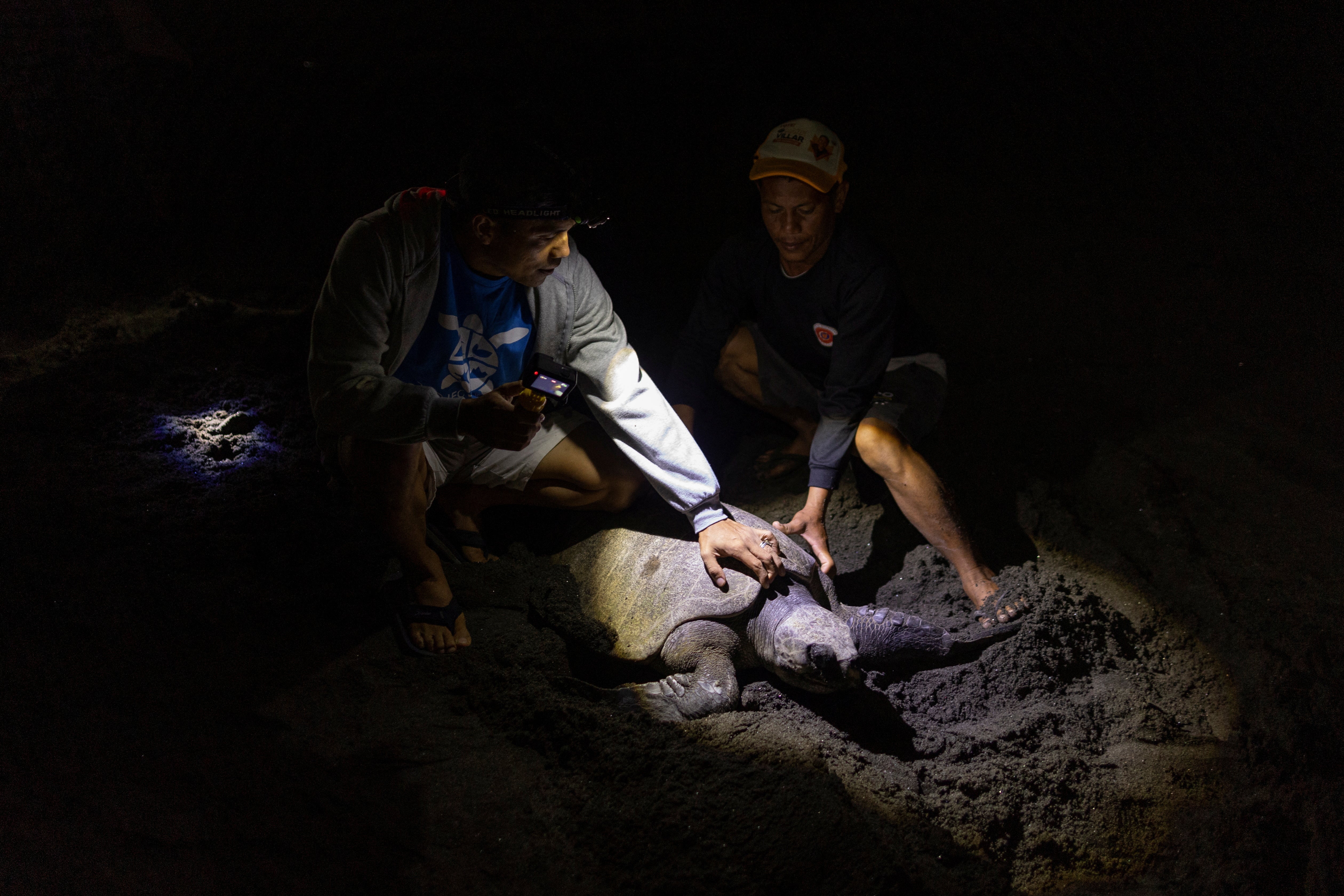Turtle poachers turn from hunting to protect the most endangered of the species in Philippines
Turtles once hunted for their meat and eggs are being kept safe by those who poached them

Armed with a wooden stick, a bucket and a headlamp, Philippine construction worker Johnny Manlugay hunts every night for the eggs of sea turtles on the pristine beaches of the northern province of La Union.
The 55-year-old can easily spot nesting sites, having been trained in his youth by his grandfather how to track the animals and their eggs, which his family traded at the time or ate.
But his egg-stealing days are over. Now Manlugay has turned his skills to helping protect marine turtles on the provincial beaches favoured by the endangered olive ridley species to build nesting sites in the Philippines.
“I’ve learned to love this work,” says Manlugay, who is accompanied by his two dogs. “We didn’t know poaching was illegal and that we should not eat turtle eggs and meat.”
He carefully transfers each egg into his pail, along with some sand from the turtle nest, to be turned over to the group spearheading a conservation programme on the beaches, Coastal Underwater Resource Management Actions (CURMA).
All five species of sea turtles found in the Philippine archipelago – green, hawksbill, loggerhead, leatherback and olive ridley – are endangered. Slaughtered for their eggs, meat and shells, the turtles, or “pawikan” as they are called, also face threats from trade, hunting, habitat loss and the climate crisis.
But the conservation effort established in 2009 has transformed sea turtle poachers into allies, offering incentives and training to help save thousands of turtles and keep their eggs from ending up in markets and on plates.
“We talked to the poachers, and it turned out poaching was just another means for them to earn a living,” says Carlos Tamayo, the programme’s director of operations. “They had no choice.”
Sea turtles lay 100 eggs in a nest, on average, while the numbers of nests range between 35 and 40 each season, which runs from October to February.
Tamayo adds that the figure has doubled during the first year of the coronavirus pandemic. At a time when disease curbs kept people indoors, there was a rebound in many aspects of animal activity. “Last season alone, for example, we had 75 nests and we released close to 9,000 hatchlings,” Tamayo says.
Volunteers receive 20 pesos (£0.30) for each egg collected, four times what they might earn from selling them. The eggs are transferred to the programme’s hatchery to be reburied in protected areas.
Former poacher Jessie Cabagbag, who grew up eating turtle meat and eggs, says the extra income from egg collection goes a long way for his family, which relies mainly on fishing for its livelihood.
“The incentives help us pay for our food and electricity bill. When I got lucky, I was able to save and use it to buy a tricycle I use (to ferry passengers) when I could not go out to fish, so that’s another source of income,” he adds.
Cabagbag, whose wife and seven-year-old son accompany him in patrolling the La Union beach of Bacnotan, has handed more than 1,000 eggs to CURMA since October.
“I stopped poaching when we underwent training and were taught that what we have been doing was illegal and that these species of turtles are endangered,” says the 40-year-old.
Tourists flock to the spectacle of the blue-grey hatchlings scurrying madly down the sloping beach to reach the water after they are released.
The event inspired overwhelming joy in Cabagbag, he says. “I am truly proud. Even our neighbours, they appreciate what I do because it is not easy. I am happy that I get to contribute to the conservation of the pawikan.”
Photography by Eloisa Lopez
Reuters
Subscribe to Independent Premium to bookmark this article
Want to bookmark your favourite articles and stories to read or reference later? Start your Independent Premium subscription today.

Join our commenting forum
Join thought-provoking conversations, follow other Independent readers and see their replies